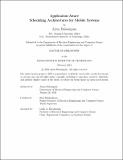Application-Aware Scheduling Architectures for Mobile Systems
Author(s)
Balasingam, Arjun
DownloadThesis PDF (32.71Mb)
Advisor
Balakrishnan, Hari
Terms of use
Metadata
Show full item recordAbstract
Architects of mobile systems have long optimized schedulers for platform-level objectives, such as system throughput or operating cost. However, these objectives could be at odds with performance indicators that applications or users of the platform might care about. This thesis proposes two-tiered architectures to realize app-aware resource allocation policies for mobile systems. The first level decomposes app-level objectives into platform-level objectives over scheduling rounds. The second level leverages classical schedulers, designed for platform objectives, as building blocks to guide the optimizer toward app-level objectives. We apply this design paradigm to build resource allocation systems and algorithms in two domains: mobility platforms and cellular networks.
Mobius allocates tasks from different customers to vehicles in mobility platforms, which are used for food and package delivery, ridesharing, and mobile sensing. Over rounds, Mobius invokes vehicle routing solvers that maximize task completion throughput to compute schedules that are fair to different customers using the platform. On a trace of Lyft rides in New York City, Mobius computes max-min fair online schedules involving 200 vehicles and over 16,000 tasks, while achieving only 10% less throughput than a classical vehicle routing solver.
Zipper is a radio resource scheduler that fulfills throughput and latency service-level agreements for individual apps connected to a cellular network. Zipper bundles apps into network slices, and leverages classical schedulers that maximize base station throughput to compute resource schedules for each slice that comply with each app's requirements. On a typical workload consisting of video streaming, conferencing, IoT, and virtual reality apps, Zipper reduces tail throughput and latency violations, measured as a ratio of violation of the app's request, by 9x, compared to traditional base station schedulers.
Date issued
2024-02Department
Massachusetts Institute of Technology. Department of Electrical Engineering and Computer SciencePublisher
Massachusetts Institute of Technology